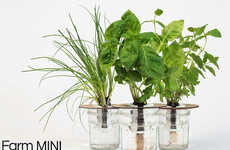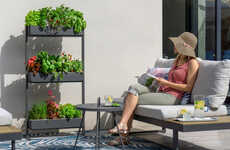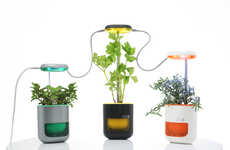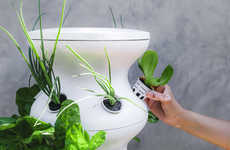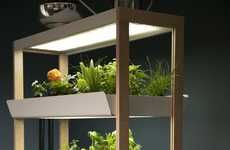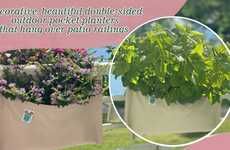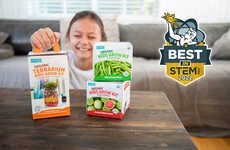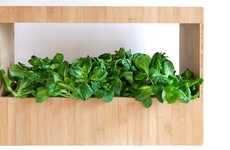
Teaching Kids Good Nutrition with Woolly Pocket
Tiana Reid — July 3, 2012 — Social Good
References: woollypocket & facebook
Written by Heather Mendenhall
Woolly Pocket is a vertical gardening system made from recycled water bottles. They are breathable and made with built-in moisture control.
These garden systems are designed to be placed vertically on a wall or outdoor railing, and can be used both indoors and outdoors. They are very consumer-friendly and allow people, who normally couldn’t garden (because they live in the city without a backyard), a way to grow their own vegetable and plants without having to employ traditional gardening methods. Or, a Woolly Pocket can resemble a piece of living wall art that can be admired in the home or the office.
Woolly Pocket also created Woolly School Garden, which is, according to their website, a gardening program designed to give “everything a school needs to create a garden classroom and teach nutrition.” Their program is available for school systems with grades K-12 and provides all the tools for each school to join their program by including 50 pockets, organic soil and seeds, compost tea, a planting chart and gardening manual, as well as nutritional and gardening curriculum for teachers. The gardening curriculum is standards-based, which gives teachers the opportunity to teach their students how to grow their own food while adopting healthy eating habits. They offer their entire garden kit for $1000. And, if your school can’t afford the $1000 kit to get started, Woolly School Garden provides a donation’s page for each individual school as well as additional resources on how to apply for grants.
Contact Information
Woolly Pocket website
Woolly School Garden website
Woolley Pocket on Facebook
Woolly School Garden on Twitter
Woolly Pocket on YouTube
Woolly Pocket is a vertical gardening system made from recycled water bottles. They are breathable and made with built-in moisture control.
These garden systems are designed to be placed vertically on a wall or outdoor railing, and can be used both indoors and outdoors. They are very consumer-friendly and allow people, who normally couldn’t garden (because they live in the city without a backyard), a way to grow their own vegetable and plants without having to employ traditional gardening methods. Or, a Woolly Pocket can resemble a piece of living wall art that can be admired in the home or the office.
Woolly Pocket also created Woolly School Garden, which is, according to their website, a gardening program designed to give “everything a school needs to create a garden classroom and teach nutrition.” Their program is available for school systems with grades K-12 and provides all the tools for each school to join their program by including 50 pockets, organic soil and seeds, compost tea, a planting chart and gardening manual, as well as nutritional and gardening curriculum for teachers. The gardening curriculum is standards-based, which gives teachers the opportunity to teach their students how to grow their own food while adopting healthy eating habits. They offer their entire garden kit for $1000. And, if your school can’t afford the $1000 kit to get started, Woolly School Garden provides a donation’s page for each individual school as well as additional resources on how to apply for grants.
Contact Information
Woolly Pocket website
Woolly School Garden website
Woolley Pocket on Facebook
Woolly School Garden on Twitter
Woolly Pocket on YouTube
Trend Themes
1. Vertical Gardening Systems - Opportunity for companies to develop innovative and sustainable vertical gardening systems using recycled materials.
2. Indoor Gardening Solutions - Potential for businesses to create consumer-friendly indoor gardening systems that allow people in urban areas to grow their own vegetables and plants.
3. School Gardening Programs - Disruptive innovation opportunity for organizations to develop comprehensive gardening programs for schools, providing tools, curriculum, and resources to teach children about nutrition and gardening.
Industry Implications
1. Gardening Equipment - Companies in the gardening industry can explore developing vertical gardening systems and indoor gardening solutions.
2. Education - Schools and educational organizations can implement gardening programs like Woolly School Garden to teach students about nutrition and healthy eating.
3. Recycling - Opportunity for recycling companies to collaborate with gardening equipment manufacturers to create sustainable gardening systems using recycled materials.
3.2
Score
Popularity
Activity
Freshness


